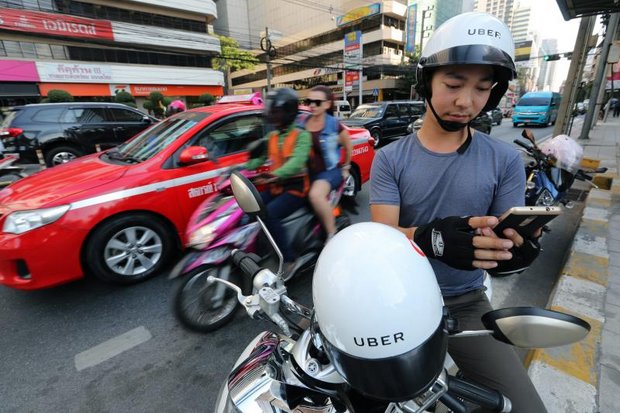
Word reached the Department of Land Transport last week that disruptive technology is the single coolest and awesomest fad around, so those cool shufflers of extreme paper immediately disrupted the latest and coolest item they could find, and thought it was pretty cool.
Hours later, Bangkok had lost an actual cool start-up, a world's first, in fact. The city lost two at a single stroke, competitors who unfortunately not only triggered the automatic Luddite alarm, but messed with the military regime's carefully laid plan for a regimented, registered and, especially, politically intimidated motorcycle taxi business.
Say goodbye UberMoto, the San Francisco-based company that virtually invented the gig economy and did, in fact, invent the smartphone-connected business of motorcycle taxis you can call to your door. Well... could call. Also, farewell GrabBike, the similar service brought to Bangkok commuters by a company founded in Malaysia, which is a foreign country and thus unacceptable to the military government.
Last Tuesday, current deputy commander of the 1st Royal Guards' 1st Division, Col Kanthachai Prachuabaree, detailed why he was allowing the DLT to take credit for ridding Bangkok of these new-fangled smartphone mototaxi drivers.
They are a risk to national security, because legacy drivers sometimes get angry and might, in the future, employ fisticuffs. They failed to pay taxes (although no taxes are due). And they steal jobs from Thais because Uber and Grab companies were invented abroad. So, different from Coca-Cola and Samsung then, only in providing more actual jobs.
Question: What does the military have to do with this?
Answer: Quite a lot. The army is directly involved in the motorcycle taxi business. But by design or accident, it is unaware of technology, knowing only its traditions of legacy and patronage.
Shot: Twenty-three months ago, your still-nervous coupmakers were worried about opposition and loyalists of Lord Voldemort na Dubai. They rounded up every motorcycle taxi driver, and reorganised their trade. The then-commander of the 1st Royal Guards, Maj Gen Apirat Kongsompong, personally supervised the operation. (Now a three-star, Lt Gen Apirat is the country's leading lottery ticket-selling expert.)
Chaser: The army got full control of all Bangkok motorcycle-taxi drivers. They also got informers at every corner rented out to motosai taxis, access to money via "fees for new vests" and a full list of every driver down to ID card number and fingerprint — the whole wheel of cheese.
Hangover: Fast forward. It is May, 2016. UberMoto and Grab Bike are operating an explosively popular business, with consumer choice, additional layer of safety to customers via GPS tracking, and all at the cost of occasionally ticking off some of the legacy, army-installed, military-protected drivers.
The Next Day: The military protected its turf. But there's a high cost to this, in consumer opinion and distrust.
The military government has shouted its Digital Thailand slogan, even at the UN. It adopted the female ex-premier's programme to exit the middle-income trap by 2020 through technology. It has announced tax incentives and cost-reduction programmes for anyone with a start-up idea.
Motorcycle taxis via organised, GPS-tracked, fixed-price smartphone apps would seem to qualify and then some. They had never been tried before. Anywhere.
General Prime Minister Prayut Chan-o-cha ordered teachers just 10 days ago to require students to innovate, and reward those who respond. Last January, his spokesmen said Gen Prayut personally ordered the Ministry of Science and Technology to sponsor Startup Thailand 2016. It was held less than a month ago, and showcased some brilliant innovation by young Thais.
They got kind words, a pat on the shoulder, followed immediately by the removal of the most innovative, tech-heavy, Thai-centric start-up ever.
The Uber-Grab ban exercised Bangkok last week. Social media appeared to agree the government is trying to get away with mouthing kind words for smart people with start-ups, while quickly going all-Luddite on smart people who disrupt cosy arrangements of the powerful. One of these things is unlike the other.
Young, smart, imaginative entrepreneurs were shocked. Last month, they got promises of support, but this month they watched the promisers axe a tech-driven entrepreneurial. Who next will catch the evil eye of Luddites who are green-shirt supporters?
Korn Chatikavanij, who is 52 and doesn't have to take a motorcycle taxi, was acerbically critical of the double standards. The military-run government, he pointed out, profits from the old-economy drivers by selling them vests, and now has banned the gig-economy drivers, who provide much less corruption opportunity.
It turns out there is already a phrase for this. The daily Bangkok Post quoted Facebook commenter Sukanya: "Another case of Only in Thailand."